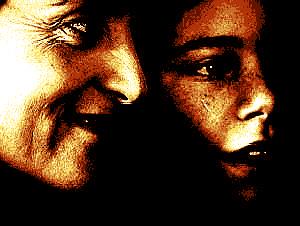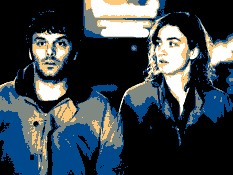Film Review

The problem with the film is not its style, which admittedly is arty but not totally unappealing. What really offends is the totally abstract nature of its narrative. Neither character nor location has any concrete form and without this it is hard, if not impossible, to develop any kind of interest in the drama.
Michel Piccoli has clearly been inspired by the works of Franz Kafka and has attempted to create the cinematic equivalent of the world of abstract paranoia which pervades Kafka's work. The problem is that (a) Michel Piccoli is not Franz Kafka, (b) few spectators have any first hand experience of the world in which Kafka lived, and (c) it is notoriously difficult for even an experienced director to transpose a complex literary work into an effective piece of cinema. Piccoli's failure in doing the latter is emphasised by a lamentably weak script and some unutterably wooden acting performances. The film's only artistic strong point is Sabine Lancelin's wondrously atmospheric photography, which certainly does evoke the mood of Kafka's novels - but this really cannot make up for the film's glaring deficiencies in other areas.
© James Travers 2004
The above content is owned by frenchfilms.org and must not be copied.
Film Synopsis
In an unnamed country, a group of revolutionaries say their goodbyes, glad to have seen a brutal dictatorship replaced by a nascent democracy. When his wife Sylvie returns to her native France to report on her country's political transformation, A., a well-known militant, attempts to get a visa for himself and his daughter Joyce to join her. Whilst waiting for the administrative processes to do their work, A. retires to a holiday home on a deserted beach with his daughter. It soon becomes apparent that new regime is not quite what it appears to be…© James Travers
The above content is owned by frenchfilms.org and must not be copied.
Similar Films
Here are some other films you may enjoy watching:- Jeanne la Pucelle II - Les prisons (1994)
- Lacenaire (1990)
- Le Joueur d'échecs (1927)
- Sous les yeux d'occident (1936)
- La Marseillaise (1938)
Other related links:
Film Credits
- Director: Michel Piccoli
- Script: Ludivine Clerc, Michel Piccoli, François Maspero (novel)
- Cinematographer: Sabine Lancelin
- Cast: Jerzy Radziwilowicz (A.), Dominique Blanc (Sylvie), Jade Fortineau (Joyce), Teresa Budzisz-Krzyzanowska (Emma), Ignacy Gogolewski (Sider), Roger Jendly (Gilles), Marco Calamandrei (Le journaliste), Armen Godel (Responsable communication), Pierre Arbel (Le consul), Roland Sassi (Mr. Schwartz), Marcel Robert (Le préposé consulat), Jacek Borkowski (Instituteur), Henryk Machalica (Grand écrivain), Stanislaw Brudny (L'homme à la malette), Nathalie Eno (La femme Shökor), José Pinto (Le pêcheur), Jerzy Lapinski (Fonctionnaire de l'ambassade), Eugeniusz Priwieziencew (Le fouineur), Ryszard Pracz (L'huissier), Janusz Bukowski (Le fontionnaire 1)
- Country: France / Portugal / Switzerland / Poland
- Language: French
- Support: Color
- Runtime: 114 min
- Aka: The Black Beach
The very best fantasy films in French cinema


